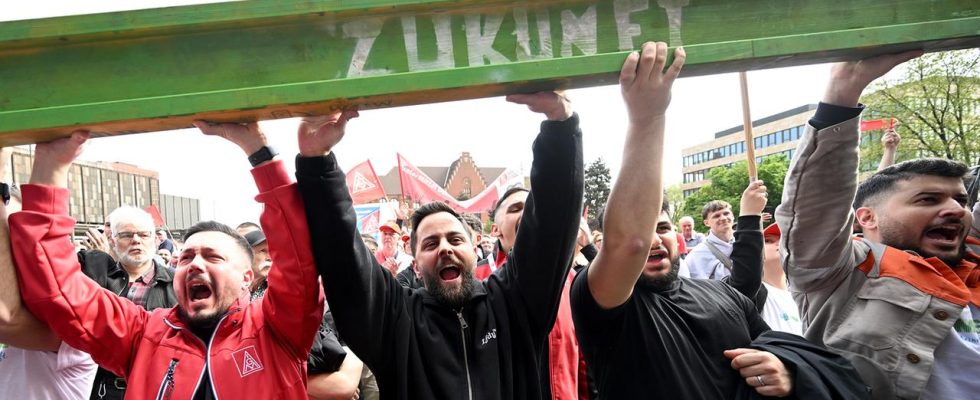background
Thousands of Thyssenkrupp Steel employees protested in Duisburg today. Trade unionists criticize how management handled the deal with the new co-owner. The unrest is great.
“A declaration of war”, “not a good style” and “not a good start” – this is how representatives of IG Metall and the works council at Thyssenkrupp commented on the news of the new investor in the group’s steel subsidiary on Friday.
His name is Daniel Kretinsky and his EPCG holding company will initially take over 20 percent of Thyssenkrupp Steel. The share should then increase to 50 percent in the medium term. There was no information about the terms of the deal that Thyssenkrupp CEO Miguel Lopez presented on Friday.
Staff meeting cancelled
Actually, several thousand employees from Thyssenkrupp’s steel division were supposed to come to the Duisburg football stadium today to find out more information about the restructuring of their company.
The appointment was canceled – because the union is angry. Angry at the entire Thyssenkrupp group and its CEO Miguel Lopez. Apparently the news of the investor’s entry caught them off guard. The news hit like a bomb, according to IG Metall.
“Undermining co-determination”
When the deal was announced, CEO Lopez emphasized how important it was to him that the employee side was involved – and then had to hear from the unions that he was undermining the “long tradition of co-determination” through the way the deal with Kretinsky was arranged had been.
“We don’t know anything like this here, where co-determination is simply ignored,” say works council representatives. Instead of a staff meeting for information, the employee side organized a large rally in front of Thyssenkrupp headquarters.
The union wanted to send a signal that the restructuring of the company and especially the steel division can only happen with it. And demands guarantees from the new investor via a newspaper interview: “No layoffs, no site closures, compliance with collective agreements and agreements,” says Jürgen Kerner, second chairman of IG Metall. Kerner is also deputy chairman of the supervisory board of Thyssenkrupp AG.
It has long been known that the Thyssenkrupp group as a whole is looking for a buyer for its steel division. The conversion to climate-friendly production using hydrogen as an energy source is very capital-intensive, while at the same time the demand for the rather expensive German steel is falling.
High capital requirements – even in the long term
Thyssenkrupp has received two billion euros from the state and federal government for the construction of the first blast furnace based on hydrogen technology, but the capital requirement will remain high in the future – because it is still completely unclear at what cost and where the company will get the hydrogen from will refer.
Because hydrogen is only climate-friendly or “green” if it can be obtained with the help of renewable energies. CEO Lopez therefore urgently needs someone who can bring fresh money and access to cheap energy. Kretinsky and his holding EPCG have not yet been active in steel – but they make their money primarily from trading electricity. Electricity that has so far come primarily from fossil fuels, such as brown coal.
Get out what’s left?
This is not the only reason why there are doubts as to whether the Czech billionaire can be a real help in transforming Thyssenkrupp Steel into a climate-neutral company. Energy expert Felix Christian Matthes from the Freiburg Eco Institute sees Kretinsky as a typical representative of so-called “tail end” investors: “They go into declining industries, take out what is still there and leave the resulting costs to the state.”
Companies with high provisions are particularly attractive. Kretinsky demonstrated very similar behavior with his involvement in the East German lignite mining area. “He invests in coal-fired power plants and pays dearly for their closure,” says Matthes and warns: “The alarm bells should ring as soon as complex corporate structures are set up through which financial resources could then flow out.” This is the path that Kretinsky took, for example, at the energy supplier LEAG.
Trade unionists want to send a clear signal
Nevertheless, the unions do not want their protest to be understood as a protest against Kretinsky and his holding company. “If someone wants to invest money, we’ll be happy to take a look at it,” says the works council. But the union members want to set an example – they want to show that the employees have a say in the restructuring of Thyssenkrupp and, above all, in the sale of the steel division.
They also receive support from politicians. Federal Labor Minister Hubertus Heil, North Rhine-Westphalia Labor Minister Karl-Josef Laumann and Bundestag President Bärbel Bas appeared at the rally with thousands of steel workers. The SPD parliamentary group postponed its entire meeting to the demonstration.
Jörg Marksteiner, WDR, tagesschau, April 30, 2024 8:55 a.m

